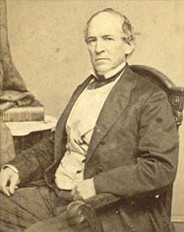by Dr. Frank D. Milligan
One of the most extraordinary Civil War wartime diaries written in a northern city was authored from 1861 to 1865 by Horatio Nelson Taft, a Washington resident and government clerk. His entries describe the prevalent fear felt by Washingtonians of invasion by the southern armies that seemed to swarm its Virginia and Maryland hinterland at will.

The diaries provide startling insight into “daily life” within a city ill prepared to handle the onslaught of hundreds of thousands of military personnel, office seekers, and scoundrels who gravitated to it seeking fame and fortune. Reading the diaries one can feel the terror that raced through the city, often time sparked by a sudden mobilization of regiments breaking their camps and kicking up clouds of dust as they marched in quick step past the White House and over the Potomac into Virginia. Sadly, Taft also describes many of those same soldiers as they limped back from the fronts and jammed Washington’s military hospitals, one of which was in the same Patent Office building in which Taft worked.
We see a man of immense pride struggling to survive on a meager clerk’s salary, and facing ever increasing prices for the fuel, food and clothing for his family. Death from smallpox and other diseases stalked the streets of Washington during many of these dreary winter months when too many injured and disease–ridden soldiers and newly freed or escaped African Americans jammed too few Washington hospitals and “contraband” camps.
Death entered the Taft home in a very direct way in the winter of 1862 when one of the Taft boys’ best friends, Willie Lincoln, died in his White House bedroom. The diaries provide insight into the strong friendships that developed between the Lincoln and Taft children in the year leading up to that tragic death. It seems at times as if the four boys were inseparable, playing and over-nighting at the White House where they made forts and scouted Confederate encampments in Virginia from the roof of the Executive Mansion, and staging plays which the President rarely missed attending.
The gloom of the winter diary entries was typically replaced with optimistic spring musings that mirrored the confidence that swept through the capital with the arrival of a fresh recruits, warm sun and dry roads. But too often the pleasant and optimistic spring diary entries gave way to the blistering heat and humidity of Washington summers and battlefield stalemates or defeats. Anticipation wilted as surely as did Taft’s starched collars as he doggedly pursued his daily work, sometimes far apart from his wife and children who sought refuge most years at his wife’s family’s Sag Harbor, Long Island home.
Dr. Frank D. Milligan is the Director of President Lincoln’s Cottage at the Soldiers’ Home. He is editing the Taft diaries for publication.
